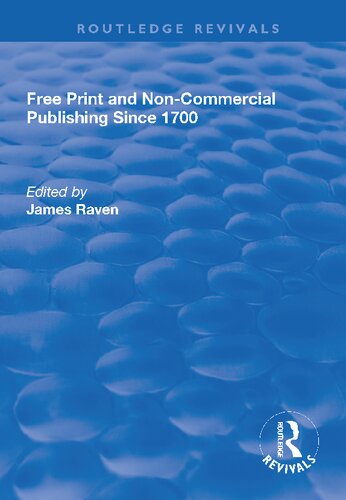

Most ebook files are in PDF format, so you can easily read them using various software such as Foxit Reader or directly on the Google Chrome browser.
Some ebook files are released by publishers in other formats such as .awz, .mobi, .epub, .fb2, etc. You may need to install specific software to read these formats on mobile/PC, such as Calibre.
Please read the tutorial at this link. https://ebooknice.com/page/post?id=faq
We offer FREE conversion to the popular formats you request; however, this may take some time. Therefore, right after payment, please email us, and we will try to provide the service as quickly as possible.
For some exceptional file formats or broken links (if any), please refrain from opening any disputes. Instead, email us first, and we will try to assist within a maximum of 6 hours.
EbookNice Team

Status:
Available4.5
41 reviewsThis title was first published in 2000: The essays in this collection re-examine the phenomenon of "free print" in print culture. By focusing on free print the volume offers perspectives in the cultural history of textual transmission from the early-18th century to the mid-20th century. "Publishing" in the sense of making the print public, embraces the free and often unsolicited distribution of religious literature, political propaganda, and civic and personal gifts. The free print examined here includes gift-books; advertisements and commemorations; the promotion of knowledge, institutions and services; commercial and philanthropic lobbying; religious and missionary activity; and political propaganda both official and underground. Broad issues range from the consideration of press finances, government intervention, and private and institutional patronage, to textual familiarity and social ritual. The approach is deliberately comparative. Ten established scholars of book and printing history, who look at very different regions and periods, test the nature of the alleged authority of print and the apparent value of the commercial tag through the study of print which arrives unbidden in the hands of its consumers. The chapters in this volume are based on papers first given at the "Print for Free" conference organized by the Cambridge Project for the Book Trust in September 1996.